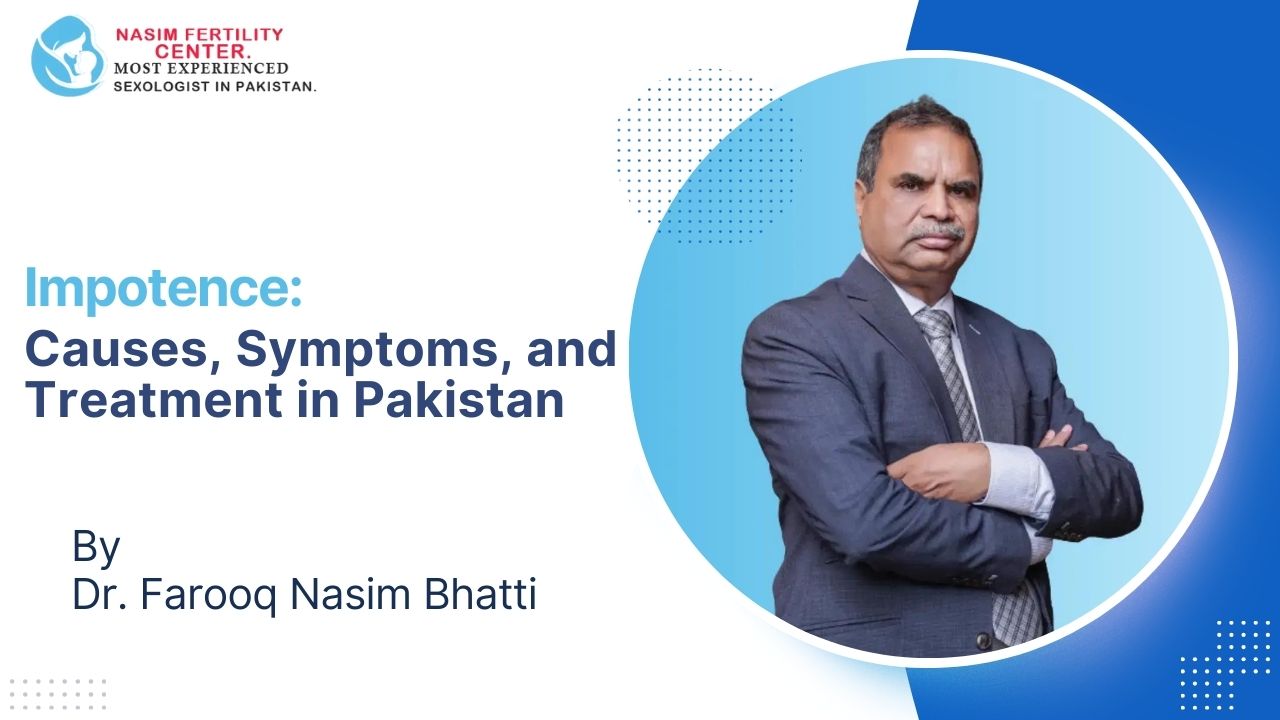
Impotence, also known as erectile dysfunction (ED), affects many men across Pakistan and the world, leading to challenges in personal relationships, self-esteem, and overall quality of life. As a leading expert sexologist in Pakistan, Dr. Farooq Nasim Bhatti offers insights on understanding, diagnosing, and treating impotence.
With over 31 years of experience, Dr. Bhatti is Pakistan’s first and only recognized medical sexologist holding multiple prestigious certifications and an in-depth knowledge of sexual health. Here, we’ll explore impotence’s causes, symptoms, and treatment options to help you make informed choices.
What is Impotence or Erectile Dysfunction – ED (نامردی)?
Impotence is the inability to attain or maintain an erection sufficient for vaginal penetration to the satisfaction of both the partners. It’s a common issue, with both physical and psychological causes that vary by age and lifestyle. For those experiencing such symptoms, it’s important to seek professional help, as there are effective treatments available.
Impotent Meaning and Impotent Meaning in Urdu
“Impotent” refers to a condition where an individual, typically a male, is unable to attain (achieve) or maintain an erection sufficient for sexual intercourse. This inability may stem from psychological factors, physical health issues, or a combination of both. In broader contexts, impotence can also signify a lack of power, strength, or effectiveness in various aspects of life.
In Urdu, “impotent” is translated as نامردی (“naamardi”), which directly refers to the condition of erectile dysfunction or lack of sexual potency in men. The word also conveys a sense of helplessness or lack of control, particularly in personal and intimate contexts. Understanding the implications of impotence is essential for addressing it effectively and seeking the appropriate medical support.
Kya ap Impotence sy pryshan hyn?
Consult Dr. Farooq Nasim Bhatti Jo Pakistan ky Leading Sexologist & or Impotence ky Ilaj ky Mahir hyn.

Causes of Impotence
Understanding the underlying causes of impotence is crucial in finding the best treatment plan. Dr. Farooq Nasim Bhatti identifies the following primary causes of impotence:
Psychological Causes
Psychological factors are significant contributors to impotence, particularly among younger men:
- Excessive Masturbation: Excessive and wrong way of masturbation.
- Performance Anxiety: Worrying about sexual performance often becomes a self-fulfilling prophecy.
- Religious Orthodoxy: Sex is perceived as bad or restrictive and not a good thing.
- Restrictive Upbringing: From parents, strong negative attitudes about sex and sexual behaviors are taught.
- Stress and Anxiety: High levels of stress can affect Neurotransmitter (chemical level), which impacts sexual health.
- Depression: Low motivation and negative thoughts can influence libido.
Physical Causes
Physical health conditions often contribute to impotence or Erectile Dysfunction – ED (نامردی), especially among men over 40. Common physical causes include:
- Diabetes: High blood sugar levels can damage blood vessels and nerves (Neuropathy) responsible for erections.
- Hypertension (High Blood Pressure): Compromises blood flow, affecting erection quality.
- Hormonal Imbalances: Low testosterone levels and thyroid issues can interfere with sexual function.
- Heart Disease: Conditions that affect blood flow can hinder the body’s ability to maintain an erection.
Medication and Lifestyle Factors
Certain medications, such as antidepressants and blood pressure drugs, are known to cause impotence. Additionally, lifestyle factors like smoking, alcohol consumption, and obesity can increase the risk.
Symptoms of Impotence in Men
- difficulty achieving an erection, or
- maintaining an erection.
Additional symptoms may include:
- Decreased libido or sexual desire
- Reduced confidence and self-esteem
- Emotional distress due to performance issues
Young men, in particular, may face additional psychological impacts, as impotence can disrupt their self-identity and future aspirations.
Types of Impotence
Dr. Farooq Nasim Bhatti categorizes impotence into two main types:
- Primary Impotence: This is a rare condition where a man has never been able to achieve an erection.
- Secondary Impotence: More common, it occurs after a period of normal sexual function. Secondary impotence is often easier to treat, with options ranging from medication to therapy.
Secondary impotence is further classified as:
- Predominantly Psychogenic ED, Impotence, or نامردی: Psychogenic causes are the main causes.
- Predominantly Organic ED, Impotence, or نامردی: Organic diseases (such as Diabetes and Hypertension) are the main causes.
Treatment Options for Impotence
Thankfully, impotence is a treatable condition, and Dr. Farooq Nasim Bhatti offers various solutions tailored to individual needs. Below are some of the most effective treatments available:
Medical Treatments
- Medication: Temporary effective medications like PDE-5 inhibitors are not used because people can become dependent on them, and over time, they begin to lose their effectiveness and become ineffective. Instead, sex therapy, counseling, and medications (that are not from the PDE-5 inhibitor group i.e. temporary effective medicines) are used to restore natural sexual erection and strength. With this approach, natural sexual erection and power is revived, and there is no need for future treatment from any doctor.
- Assisted Erection Methods: In organic Impotence or ED (نامردی) patients if Natural Restoration is not possible then assisted erection methods are offered to the patient as per satisfaction in the following order of preference:
a. PDE-5 Inhibitors (temporary medicines): These oral medications increase blood flow to the penis, temporarily aiding erections. While effective, they are intended for short-term use and may lose effectiveness over time.
b. Intracavernous Injection: This involves injecting medication directly into the penis to induce an erection by relaxing blood vessels. It’s an option when oral meds don’t work but requires careful administration.
c. Vacuum Therapy Device: A non-invasive device that uses suction to draw blood into the penis, creating an erection. A constriction ring is then placed to maintain it. This option is effective and drug-free but requires practice.
d. Penile Prosthesis i.e. Surgical Option: For severe cases, penile implants offer a long-term solution, though surgery is generally considered after other treatments have been tried. (This is the point of Surgery with the heading modified) - Surgery: For severe cases, penile implants offer a long-term solution, though surgery is generally considered after other treatments have been tried.
Sex Therapy and Counseling
- Explaining the nature of the problem, Erectile Dysfunction – ED, Impotence, or نامردی
- Enhancing the communication between partners
- Advising certain home exercises
- Involving both partners in the treatment
Lifestyle Changes
Lifestyle adjustments often play a major role in improving impotence:
- Exercise: Regular physical activity improves blood flow and reduces stress.
- Diet: A balanced diet can promote heart health and hormone balance.
- Stress Management: Techniques like mindfulness, meditation, and deep breathing can help manage stress, which can be a significant cause of impotence.
Can Impotence Be Cured?
- PDE-5 Inhibitors,
- Intracavernous Injection,
- Vacuum Therapy Device, or
- Penile Prosthesis
Impotence and Masturbation: Addressing the Myths
While cultural myths persist, there’s no scientific evidence linking masturbation to long-term impotence. with It is the wrong way of masturbation and excessive masturbation that causes impotence or Erectile Dysfunction – ED (نامردی). While cultural myths persist, there’s no scientific evidence linking masturbation to long-term impotence if masturbation is done in the right way.
Why Choose Dr. Farooq Nasim Bhatti for Impotence Treatment?
Dr. Farooq Nasim Bhatti, MBBS, Diplomat: The American Board of Sexology (USA), FAACS (USA), is the first MBBS doctor in Pakistan to hold the DABS (USA) degree in the treatment of male sexual health issues, which he obtained in 1999.
Dr. Farooq Nasim Bhatti has presented (more than 20) research papers on the treatment of sexual disorders at international conferences held in Germany, the USA, Turkey, Singapore, South Korea, Hong Kong, Malaysia, India, and Spain, where his work has been highly appreciated.
He is Pakistan’s foremost medical sexologist, dedicated to providing personalized and confidential treatment plans for patients suffering from impotence. With a patient-centered approach, Dr. Bhatti ensures that his methods are safe, effective, and tailored to meet each patient’s unique needs.
Frequently Asked Questions
What is meant by impotence?
Impotence is the inability to attain or maintain an erection sufficient for vaginal penetration to the satisfaction of both the partners.
Can impotence be cured naturally?
Yes, lifestyle changes, exercise, and stress management techniques can often improve erectile function naturally.
What is the most common cause of impotence?
Common causes include psychological factors, cardiovascular conditions, diabetes, and hormonal imbalances.
Can stress cause impotence in young men?
Yes, stress is a significant cause of impotence, especially in younger men.
What is the difference between impotence and infertility?
Impotence is the inability to achieve or maintain an erection, while infertility refers to the inability to father children due to low male factor or reproductive issues in female.
Conclusion
Impotence, though challenging, is a condition with a range of effective treatments. Seeking timely and professional help from an expert, such as Dr. Farooq Nasim Bhatti, can restore confidence, improve relationships, and enhance quality of life. As Pakistan’s top medical sexologist, Dr. Bhatti is committed to helping men overcome impotence through advanced, compassionate care. If you or a loved one is experiencing symptoms of impotence, don’t hesitate to book a consultation today for a personalized, confidential treatment plan.
Disclaimer
This information is for educational purposes and not the treatment. For treatment, you need to consult the doctor.

Dr. Farooq Nasim Bhatti (MBBS, FAACS – USA, Diplomate: American Board of Sexology, CST, HSC – Hong Kong, CART – Malaysia & China) is a qualified medical sexologist with 30+ years of experience. He has presented 21+ research papers internationally and treats sexual dysfunction through sex therapy, counseling, and pharmacotherapy to restore natural sexual function without temporary medication.

Regain Confidence with Our ED Solutions
Explore effective treatments for erectile dysfunction. Take charge of your intimacy today.


